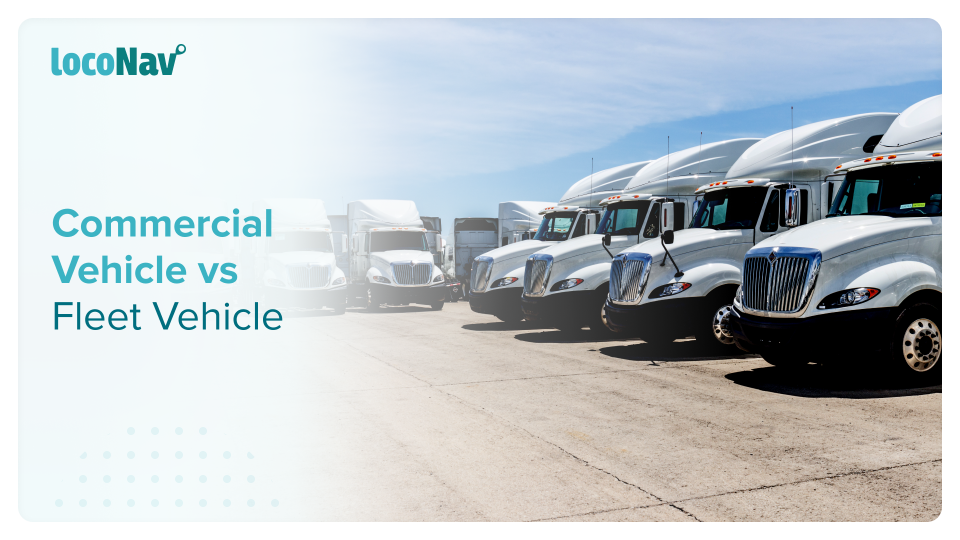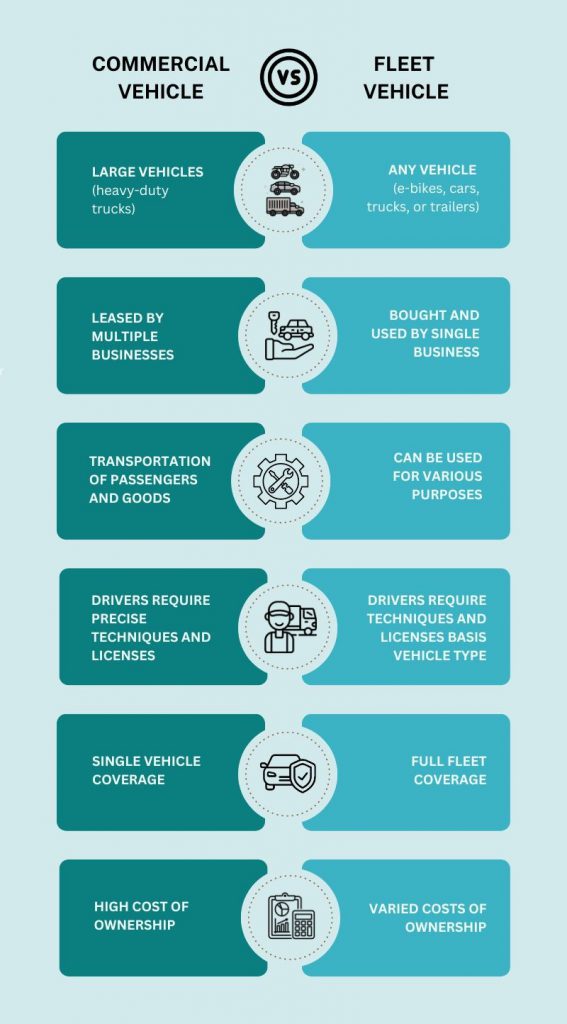

The words “commercial vehicle” and “fleet vehicle” are frequently used interchangeably, and while there is some crossover in their definitions, they should not be used interchangeably, at least not in most circumstances. To clear the air and differentiate the two, will highlight the differences between commercial vs fleet vehicles.
What Are The Different Types Of Vehicles?
Fleet Vehicle
- Managed and owned by a particular business.
- Operated by the said business’ employees for work.
- Can be used for claiming ownership taxes.
- Can be any vehicle: e-bikes, cars, trucks, or trailers.
Commercial Vehicle
- Usually large vehicles, mostly heavy-duty trucks.
- Could be a fleet vehicle or not.
- Used for transportation of large amounts of passengers or commercial goods.
Business Vehicle
- Usually owned by a single person, but used for business purposes.
- Available for usage in a personal capacity as well.
- The ownership tax deduction is dependent on how the vehicle is being used.
Manage your fleet efficiently with LocoNav’s Fleet Management Solutions!
Comparison Of Commercial vs Fleet Vehicle On:
While every fleet vehicle is a commercial vehicle, not all commercial vehicles are fleet vehicles. Let us discuss the specifics of both of these terms separately.

Type
- Commercial Vehicles
Usually large vehicles, mostly heavy-duty trucks.
- Fleet Vehicles
Can be any vehicle: e-bikes, cars, trucks, or trailers.
Leased Or Purchased
- Commercial Vehicles
May be leased or owned since they can be used for multiple businesses.
- Fleet Vehicles
Purchased and owned by a particular business.
Utility
- Commercial Vehicles
Since commercial vehicles are mostly large, heavy-duty vehicles, they are generally used for the transportation of passengers and commercial goods.
- Fleet Vehicles
Their utility is limited to the business that owns them. Since they can be vehicles of any size, their utility is vast.
Driver Behaviour
- Commercial Vehicles
Owing to their size, commercial vehicles require precise driving techniques and licenses. The financial implication of a commercial vehicle accident can be huge. Therefore, the driver of a commercial vehicle must abide by all traffic laws religiously.
- Fleet Vehicles
Fleet vehicles are of different varieties and therefore require different driving behaviours for optimal performance.
Insurance
- Commercial Vehicles
A commercial vehicle insurance policy provides coverage for every single vehicle.
- Fleet Vehicles
A fleet insurance plan is a type of vehicle insurance that collectively covers several fleet vehicles at the same time.
Cost Of Ownership
- Commercial Vehicles
Since these are heavy-duty vehicles, the cost of ownership is relatively high. This includes both costs of acquisition and maintenance costs.
- Fleet Vehicles
These can be of any size, so the cost of ownership varies depending on the types of vehicles in the fleet.
FAQ
What is a Non-Fleet Vehicle?
Non-fleet vehicles are vehicles that are not part of a dedicated fleet but are still owned by a business.
What Is The Similarity Between Commercial And Fleet Vehicles?
There may not be any obvious similarities between commercial vehicles and fleet vehicles but there surely is some overlap. Both of them are used for business purposes. Commercial vehicles are heavy-duty, and fleet vehicles can be heavy-duty as well.
Are Commercial And Passenger Vehicles the Same?
No, commercial vehicles and passenger vehicles are not always the same. However, if a passenger vehicle is large, it may bear similarities to a commercial vehicle.